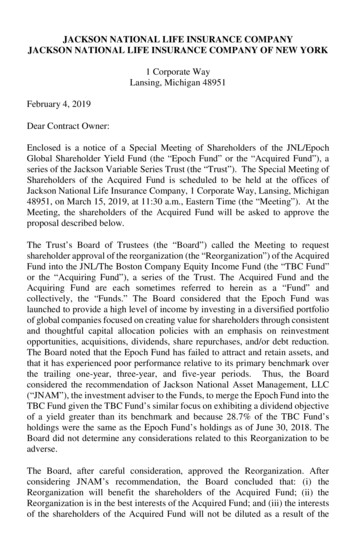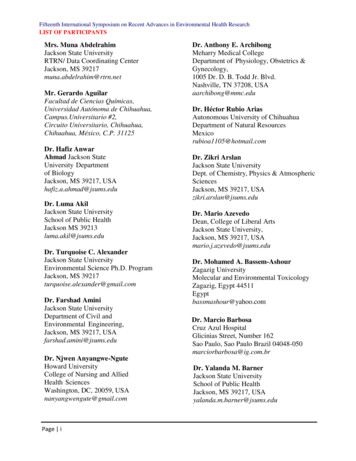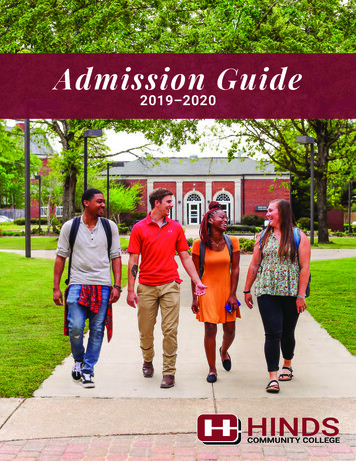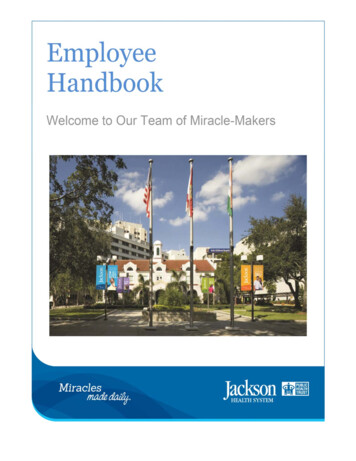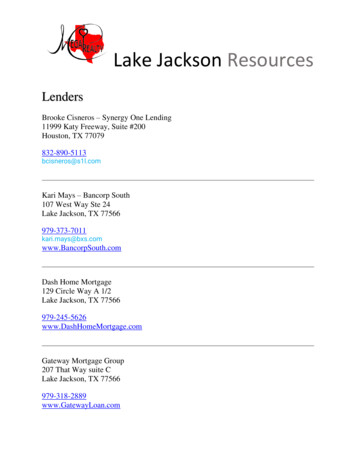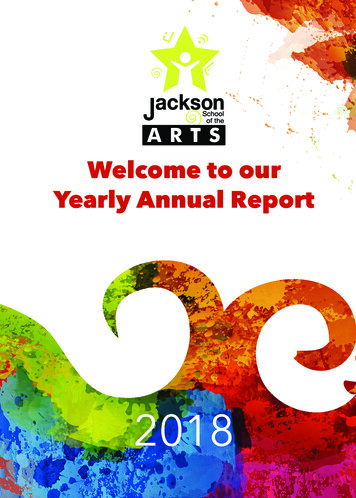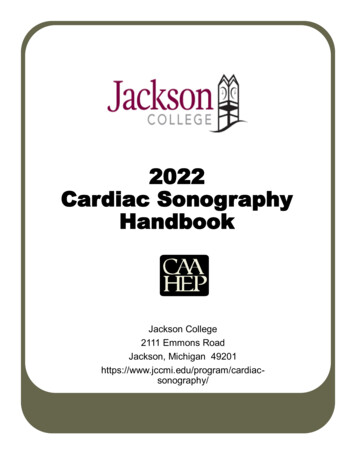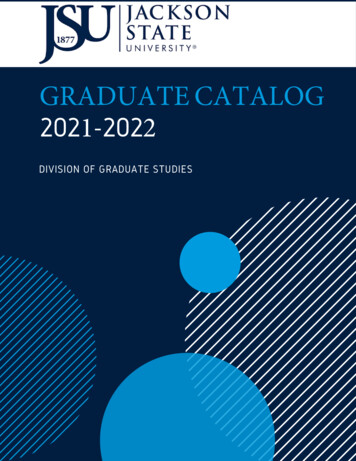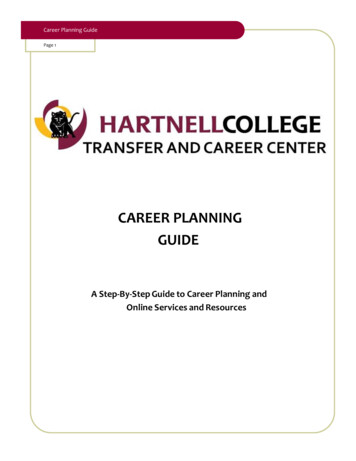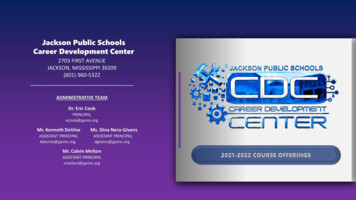
Transcription
Jackson Public SchoolsCareer Development Center2703 FIRST AVENUEJACKSON, MISSISSIPPI 39209(601) 960-5322ADMINISTRATIVE TEAMDr. Eric CookPRINCIPALecook@jpsms.orgMr. Kenneth DeVineASSISTANT PRINCIPALkdevine@jpsms.orgMs. Dina Nero-GivensASSISTANT PRINCIPALdgivens@jpsms.orgMr. Calvin MeltonASSISTANT PRINCIPALcmelton@jpsms.org
E-BOOK VOLUME 1WHY TAKE A CTE COURSE?CTE courses help train a qualified workforce for today’s competitive job market. Our research-basedprograms meet national and accreditation standards. Because Career and Technical Education is criticalto Mississippi’s economic development, we partner with local business leaders and legislators to achievecommon goals. CTE courses help students develop marketable job skills and earn national industrycertifications needed to achieve their occupational goals.HOW ARE CTE CLASSES TAUGHT?VISIONThe Career Development Center is dedicated to creating a school-wide culture wherestudents can identify, select, and pursue career pathways. They will also develop necessaryskills that lead to national certifications, post-secondary careers and/or collegeopportunities.MISSIONAt the Jackson Public Schools Career Development Center, we strive to create a safeenvironment where all students can learn. The learning process is an inclusive andcollaborative effort of students, staff, family, business and industry, and the community. Thiscollaboration creates the foundation for students to participate in a wide range of activitiesand to utilize technology. They will also be successful in the workplace or post-secondaryeducation and achieve their best individual growth in a diverse and changing world.Page 1CTE classes housed at the Career Development Center are available to students from all high schools inthe Jackson Public School District. The classes are conducted in classrooms and laboratories equipped toindustry standards. Students also have the opportunity for Work-Based Learning experiences at actualbusiness and industry locations.CTE COURSE SEQUENCINGStudents enrolled in CTE courses must complete all courses in a pathway in order to receive pathwaycredit. A pathway usually consists of introductory and concentrator courses.INTRODUCTORY COURSE – (First Year) A CTE beginning level introductory course that containsintroductory concepts required to build foundational and general knowledge.CONCENTRATOR COURSE – (Second Year) A CTE course beyond the introductory level that is intended toprovide more in-depth instruction and exploration of a specific industry sector. This is the final course ina planned sequence of courses that provides a rigorous and intensive culmination of a course of study.Page 2
CAREER DEVELOPMENT CENTERE-BOOK VOLUME 1DUAL CREDIT-DUAL ENROLLMENTThe Career Development Center offers dualcredit/dual enrollment through Hinds CommunityCollege for second-year students in the careerpathways of Early Childhood Education; Marketing;Lodging, Hospitality and Tourism Management; andAutomotive Services Technician.CAN I GET CREDIT FOR TAKING CTE CLASSES?Each CTE course awards Carnegie units for graduation requirements. Students earn two (2) Carnegieunits for each course for a total of four (4) credits for completion of a pathway. Students must committo two (2) years of enrollment in the same CTE program at the Career Development Center as part ofthe requirements for a Mississippi high school diploma with a Career and Technical Educationendorsement.STUDENT SUPPORT SERVICESEach CTE student has access to staff members dedicated tosupport services. Student Service Coordinators provideinterventions and supports for students to assist withacademics, tutorials in CTE programs, and testingmodifications and accommodations. CTE GuidanceCounselors offer assistance to students in scheduling,program performance, scholarships, and personalcounseling services. The Work-Based Learning Specialistshelp students with pursuing job opportunities, workreadiness skills, and internships.ACADEMIC CREDITSSeveral of the CTE programs at the Career Development Center offer students the opportunity to earnacademic credits. For Science Carnegie units, the following CTE courses may be used to fulfill sciencerequirements for graduation: one (1) unit may be in Concepts of Agriscience and a second unit may beearned by completing two of the following three courses: Plants, Animals and Environment. Two (2)units may be earned for students completing the pathway in Health Sciences and Sports Medicine.Health Sciences and Sports Medicine may be accepted in lieu of Contemporary Health to meet thegraduation requirement for one-half (1/2) Carnegie unit in Health. Digital Media Technology may beaccepted in lieu of the art requirement for students.Page 3Page 4
CAREER DEVELOPMENT CENTERE-BOOK VOLUME 1NATIONAL CERTIFICATIONSStudents enrolled at the Career Development Center have an opportunityto earn national industry certifications in many of our program areas.Students enrolled in Construction Core/Carpentry, Heating, Ventilationand Air Conditioning (HVAC), and Welding may earn National Center forConstruction Education and Research (NCCER) certification. ServSafecertification is available to students enrolled in Culinary Arts. Studentsenrolled in Automotive Services Technician and Collision RepairTechnician may earn Automotive Service Excellence (ASE) certification.Fuji Automatic Numerical Controls (FANUC) certification is available tostudents enrolled in Engineering.There are 16 Career Clusters in the National Career Clusters Framework, representing 79 Career Pathways to help learners navigate their way togreater success in college and career. The Jackson Public Schools Career Development Center offers coursework in 13 of the Career Clusters in 17Career pathways. These programs help learners discover their interests and their passions, and empowers them to choose the educational pathwaythat can lead to success in high school, college and career.CTE STUDENT ORGANIZATIONSStudents enrolled in CTE courses have the opportunity toparticipate in student organizations. CTE StudentOrganizations are extracurricular groups that help studentsfurther their knowledge and skills by participating inactivities, events, and competitions. Students also developleadership skills and work-ready skills as a result ofmembership. The Career Development Center sponsors thefollowing student organizations for membership: EducatorsRising; Family, Career and Community Leaders of America(FCCLA); Health Occupations Students of America (HOSA);National FFA Organization; SkillsUSA; and TechnologyStudent Association (TSA). Qualifying students also have anopportunity to join the National Technical Honor Society(NTHS)Page 5AGRICULTURE, FOOD & NATURAL RESOURCESHOSPITALITY & TOURISMARTS, A/V TECHNOLOGY & COMMUNICATIONSHUMAN SERVICESARCHITECTURE & CONSTRUCTIONINFORMATION TECHNOLOGYBUSINESS MANAGEMENT & ADMINISTRATIONLAW, PUBLIC SAFETY, CORRECTIONS & SECURITYEDUCATION & TRAININGMANUFACTURINGFINANCEMARKETINGGOVERNMENT & PUBLIC ADMINISTRATIONSCIENCE, TECHNOLOGY, ENGINEERING & MATHEMATICSHEALTH SCIENCETRANSPORTATION, DISTRIBUTION & LOGISTICSPage 6
CAREER DEVELOPMENT CENTERE-BOOK VOLUME 1The programs listed below will be offered for the 2021-2022 school year. Each page contains a briefdescription of the course. Click on the icon beside each course title for more details on the program.AGRICULTURE & ENVIRONMENTAL SCIENCE & TECHNOLOGY9DIGITAL MEDIA TECHNOLOGY10SIMULATION & ANIMATION DESIGN11TELEVISION BROADCASTING & PRODUCTION12HEALTH SCIENCE/HEALTHCARE CLINICAL SERVICES17SPORTS MEDICINE18CULINARY ARTS19CARPENTRY/CONSTRUCTION CORE20AUTOMOTIVE SERVICES TECHNICIAN21COLLISION REPAIR TECHNICIAN22TRANSPORTATION LOGISTICS23HEATING, VENTILATION & AIR CONDITIONING24INDUSTRIAL MAINTENANCE25WELDING26TEACHER ACADEMY13EARLY CHILDHOOD EDUCATION14BARBERING15LAW & PUBLIC SAFETY27COSMETOLOGY16WORK-BASED LEARNING28Page 7Page 8
CAREER DEVELOPMENT CENTERE-BOOK VOLUME 1AGRICULTURE AND ENVIRONMENTAL SCIENCE & TECHNOLOGYDIGITAL MEDIA TECHNOLOGYThe Agriculture and EnvironmentalScience & Technology (AEST) programof study focuses on the science,research, and business of agricultureand environmental science andtechnology. Students explore themajor areas of Animal Sciences, PlantSciences, Agricultural Business,Environmental Sciences, AgriculturalMechanization and Technology, and Natural Resources. The Animal Science course teachesstudents how to apply biology and life science to real-world life processes of animals and wildlife.The Environmental and Natural Resources course includes exploration into conducting research onsources of pollutants or hazards that affect either the environment or the health of the population.The Plant Science course teaches students how to apply biology and life science to real-world lifeprocesses of plants and vegetation.Page 9The Digital Media Technology program of studyexplores the occupations and educationalopportunities associated with designing orcreating graphics to meet specific commercial orpromotional needs, such as packaging, displays, orlogos. This program of study may also includeexploration into designing clothing andaccessories, and creating special effects,animation, or other visual images using film, video,computers, or other electronic tools and media, foruse in computer games, movies, music videos, andcommercials. Content such as safety, ethical issuesand production, photography, graphic design, and print production will be offered to students. The audioproduction portion of the course emphasizes real-world, hands-on practice. The process of videoproduction and editing as well as career opportunities in audio and video technology are explored in thecourse. Another component of the course is motion graphics.Page 10
CAREER DEVELOPMENT CENTERE-BOOK VOLUME 1SIMULATION AND ANIMATION DESIGNTELEVISION BROADCASTING & PRODUCTIONThe Television Broadcasting and Productionprogram is designed to provide the basicfoundation, skills, and knowledge for developingand producing broadcast-quality materials.Students will learn the skills necessary to work in atelevision and broadcasting production facility.They will acquire basic and advanced writing andvideo skills and the ability to provide support in allfacets of a production studio. The program willprovide hands-on experience in the areas ofwriting, editing, shooting, directing and producingfor commercial-grade broadcasts. The Television Broadcasting and Production program of studyexplores the occupations and educational opportunities associated with the production of audio andvisual media formats for various purposes, such as TV broadcasts, advertising, video production, ormotion pictures. This program of study also includes exploration into operating machines andequipment to record sound and images, such as microphones, sound speakers, video screens,projectors, video monitors, sound and mixing boards, and related electronic equipment. Students willalso acquire basic and advanced writing skills and learn scriptwriting fundamentals.The Simulation and Animation Designprogram of study is designed forstudents who wish to develop, design,and implement projects in the field ofgame design and development. Thisprogram of study also includeexploration into the techniques andtools used in game design and thecreative design of content of suchmedia. The course focuses on the basicareas of ethics, character development,audio and video production, and design using visualization software. Content such as safety,ethical issues, video game history, career opportunities, game mechanics, and photography isoffered to students. Students have the opportunity to produce a final video game project thatincorporates the skill and knowledge learned in simulation and animation design courses, givingstudents the chance to showcase what they have learned and accomplished. Upon thecompletion of this course, students also will have put the finishing touches on a video gameportfolio that is cumulative of their work throughout all semesters of simulation and animationdesign.Page 11Page 12
CAREER DEVELOPMENT CENTERE-BOOK VOLUME 1TEACHER ACADEMYEARLY CHILDHOOD EDUCATIONThe Teacher Academy program of studyis a high school program with coursesdesigned to attract students to the fieldof education, provide information andfield experiences relevant to pursuing adegree in education, and preparestudents for the rigors of a career ineducation so they will remain long-termeducators. The Teacher Academypathway includes classroom and handson experiences that will preparestudents for employment or continuingeducation in the education field. Students receive history, theory, and professionalism needed tounderstand the educational system. provides students with the opportunity to gain knowledge andpractice needed to enhance themselves as future educators. Students receive practice incommunication skills, planning, teaching, diverse learners, and various subject areas needed towork in the educational system. Assessment strategies needed to understand the educationalsystem is included in the course.Page 13The Early Childhood Education program ofstudy prepares students for employment orcontinuing education in the early childhoodeducation field. Emphasis is placed onstudents’ personal and professional preparationfor careers or education in the field, history, andtrends of early childhood education, children’shealth and safety, child development, and childguidance and observation. Students receiveinstruction on career and professionaldevelopment, characteristics of high-qualityearly childhood centers, management andadministration in quality child-care programs,and the learning environment.*The Jackson Public Schools Career Development Centeroperates an Early Childhood Education “Lab School” onthe campus.Page 14
CAREER DEVELOPMENT CENTERE-BOOK VOLUME 1COSMETOLOGYBARBERINGThe Barbering program of studyintroduces students to knowledgeand skills related to providingbeauty and personal care services.It prepares individuals to cut,color, perm, shampoo, and stylehair. Students are also instructedon the proper techniques for facialmassaging and shaving. Specialattention is given to hygiene,safety, skin, scalp diseases, andequipment sterilization. Included isthe study of sales, business management, laws governing the profession of barbering, and customerrelationships. Students must demonstrate the safe use of the various types of clippers, razors, shears,and combs. Additional study of the structure and function of the skin, common skin disorders, andscalp and hair disorders is included. Practices include providing facial massages, rendering plainfacials, shaving, mustache and beard trimming, and barbering services.The Cosmetology program of study introducesstudents to knowledge and skills related toproviding beauty and personal care services.Students will explore safety, infection control,and decontamination issues associated withcosmetology. Students will also explore areasof the cosmetology field including nails, naildisorders, manicures, and pedicures. Studentswill be introduced to the properties of the hairand scalp, haircutting, draping, shampooing,and rinsing. Students will gain anunderstanding of hair coloring, thermal styling, permanent waving, and chemical relaxing. The courseprovides an overview of the techniques used in cosmetology including anatomy and physiology ofcosmetology, and basic chemistry and electricity. Students will learn about the principles of hair design,braids and extensions, wigs, and hair enhancements. Students will gain understanding in hairstyling,hair removal, facials and facial massage, makeup, and advanced nail techniques. Students in this coursewill also be exposed to issues in the business of cosmetology including employment and licensing.*Students who successfully complete all requirements for the Barbering program are eligible totest for Mississippi State Board of Barbering licensure.*Students who successfully complete all requirements for the Cosmetology program are eligible totest for Mississippi State Board of Cosmetology licensure.Page 15Page 16
CAREER DEVELOPMENT CENTERE-BOOK VOLUME 1HEALTH SCIENCESSPORTS MEDICINEThe Health Sciences/Healthcare Clinical Services course is offered at Lanier High School and theCareer Development Center.Sports medicine is one of the second-courseoptions for students in the health sciencescareer cluster who have successfullycompleted the health science core class. Thesports medicine career pathway focuses onthe aspects of the prevention and care ofsports injuries. Students will learn theimportance of prevention, evaluation, acutetreatment, and therapeutic care related toinjuries in sports. Students will also learnabout the types of injuries that can occurand be introduced to the emergency servicesassociated with athletics.Health Sciences program of study introducesstudents to occupations and educationalopportunities related to diagnosing andtreating acute, episodic, or chronic illnessindependently or as part of a healthcareteam. This program of study also includes anintroduction to the opportunities associatedwith providing treatment and counsel topatients as well as rehabilitative programsthat help build or restore daily living skills to persons with disabilities or developmental delays.The Healthcare Clinical Services course (second-year) includes classroom and hands-onexperiences that will provide students with an overview of the health care field, as outlinedaccording to the health science cluster in the National Career Clusters Framework and theNational Consortium on Health Science Education. It will also begin to prepare students forcareers in occupations predicted to have a high number of available jobs in the next 10 years.Additionally, students will focus on rehabilitation techniques used to help patients recover fromsports injuries. The program offers students the opportunity to examine the different careersassociated with sports medicine and develop the workplace and employability skills associatedwith sports medicine professions.Page 17Page 18
CAREER DEVELOPMENT CENTERE-BOOK VOLUME 1CULINARY ARTSThe Culinary Arts program of studyintroduces students to occupationsand educational opportunitiesrelated to the planning, directing, orcoordinating activities of a food andbeverage organization ordepartment. This program of studyalso explores opportunities involvedin directing and participating in thepreparation and cooking of food.Preparation techniques for variousfoods are covered, along with theinformation needed to properly dothese skills safely and efficiently. Foods included in this course are stocks, sauces, soups, basicbaked goods, fruits, vegetables, potatoes, and grains. This is followed by basic nutrition andfood preparation skills for dishes with eggs, dairy products, breakfast foods, sandwiches,salads, garnishes, meat, poultry, seafood, desserts, and more complex baked goods. Itconcludes with a detailed overview and hands-on practice of some culinary business skills,followed by employability preparation requiring the students to put together job applications,résumés, and more!CARPENTRY/CONSTRUCTION COREThe Construction Core course emphasizes anoverview of construction-related trades, such ascarpentry, electrical wiring, masonry, andplumbing. This course gives students’ real-world,hands-on practice in these areas. Studentsadditionally learn fundamentals of constructionsafety, tools, math, and blueprint reading. TheCarpentry program of study explores theoccupations and educational opportunitiesrelated to constructing, installing, or repairingstructures and fixtures made of wood, such asconcrete forms (including frameworks, partitions,joists, studding, rafters, and stairways). Thisprogram of study may also include explorationinto installing, dismantling, or moving machineryand heavy equipment according to layout plans, blueprints, or other drawings. Students interestedin a career pathway of Architecture and Draft receive an introduction to the field as well asfundamentals of safety, math, geometric construction, orthographic projection, and computeraided drafting (CAD) applications.Page 19Page 20
CAREER DEVELOPMENT CENTERE-BOOK VOLUME 1COLLISION REPAIR TECHNICIANAUTOMOTIVE SERVICES TECHNICIANThe Collision Repair program of study teachesstudents classroom and hands-on fundamentalsof the collision repair industry. Students willlearn shop safety and organization,mechanical/electrical components,nonstructural analysis and damage repair,structural analysis and damage repair, andpainting and refinishing. Collision RepairTechnician covers information on safety, toolidentification/use, employee information,collision estimating, paint mixing/matching,service specification and service information,measurement, personal and business skills, metal finishing and body filling, movable glass/hardware,inspecting and analyzing body components, repairs to outer body panels, frame inspection andrepair, unibody inspection and repair, advanced welding, frame inspection and repair, unibodymeasurement and repair, fixed-glass procedures, and advanced welding/cutting applications.The Automotive Services programof study teaches studentsmaintenance and light repair ofautomobiles and diagnostics ofvarious types of vehicles.Students learn to collect paymentfor services or supplies. Studentslearn the fundamentals of enginerepair, transmissions, electronicsystems, brakes, engineperformance, suspension/steeringsystems and automotive heating and air. Students perform typical vehicle maintenanceprocedures such as lubrication, oil changes, installation of antifreeze, or replacement ofaccessories like wiper blades or tires. This course contains an in-depth study of shopoperations, safety, tools and equipment, and preparing the vehicle for both service andthe customer.Page 21Page 22
CAREER DEVELOPMENT CENTERE-BOOK VOLUME 1TRANSPORTATION LOGISTICSHEATING, VENTILATION & AIR CONDITIONINGThe HVAC program of study explores theoccupations and educational opportunitiesassociated with installing, serving, orrepairing heating and air conditioningsystems and also the fabrication, assembly,installation, and repair of sheet metalproducts and equipment, such as ducts,control boxes, drainpipes, and furnacecasings. HVAC I is an emphasis on Heating,Ventilation, and Air-Conditioning. Topicsinclude employability skills, safety,construction math, construction drawings,materials handling, copper and piping,soldering and brazing, and basic electricity.HVAC II is an emphasis on Heating,Ventilation, and Air-Conditioning. Topicsinclude employability skills, safety, carbon steel piping, introduction to cooling, introduction toheating, air distribution, leak detection evacuation recovery and charging, alternating current,and basic electronics.Transportation Logistics is a pathwaydesigned to introduce students to thebroad field of supply-chain management.The program includes instruction in theapplied processes related totransportation logistics and introducesstudents to transportation practices andmaintenance of facilities and equipment.Students in this pathway will participate inactive-learning exercises, includingintegral activities and supervisedexperiences that highlight key logistics concepts. Students who successfully complete thecompetencies in this pathway will possess fundamental knowledge and skills that can be usedto secure entry-level employment or as a foundation for continuing their education. Industrystandards are adapted from the Career Cluster Resources for Transportation Logistics,developed by the National Association of State Directors of Career and Technical Education.Page 23Page 24
CAREER DEVELOPMENT CENTERE-BOOK VOLUME 1INDUSTRIAL MAINTENANCEWELDINGThe Welding program of study focuseson the development and use ofautomatic and computer-controlledmachines, tools, and robots thatperform work on metal or plastic.Students will learn how to modify partsto make or repair machine tools ormaintain individual machines, and howto use hand-welding or flame-cuttingequipment. Students will leave theclass with a firm foundation ofknowledge in the areas of employability skills, safety, and basic tool knowledge. Additionally,students will learn Oxyfuel Cutting fundamentals. Students will cover proper equipment setup, safetymeasures, and correct welding techniques. Additionally, this course will offer students theopportunity to examine GMAW and FCAW. Additionally, students will learn about GTAW. Studentswill learn safety measures, setup procedures, and welding techniques for each type of welding.Industrial Maintenance is an instructionalprogram that prepares students foremployment or continued education inthe occupations of installation,maintenance, and repair work. TheIndustrial Maintenance I courseintroduces students to fundamentals ofsafety, tools, math, blueprint reading,materials handling, fasteners andanchors, oxy-fuel cutting, and anintroduction to the National ElectricalCode. Industrial Maintenance II is a continuation of Industrial Maintenance I with the emphasis onemployability skills, safety, gaskets, packing, pumps, drivers, valves, lubrication, constructiondrawings, test equipment, material handling and rigging, mobile and support equipment,electrical theory, conductor termination and splices, hydraulic and pneumatic controls, andwelding.Page 25Page 26
CAREER DEVELOPMENT CENTERE-BOOK VOLUME 1WORK-BASED LEARNINGLAW & PUBLIC SAFETYThe Law & Public Safety course is offered at Callaway High School.This course focuses on the history of law and legal systems in the UnitedStates. Students will leave the class with a firm foundation of knowledgein these areas. Additionally, students will learn the importance of personalhealth and safety in the work environments associated with law and publicsafety. Students will also be introduced to the emergency services foundin local communities. Additionally, students will focus on corrections in thestate of Mississippi, studying specifically how jailsand prisons function. This course offers topics of allrelated community-based safety areas, includingSecurity and Protective Services, Crime SceneInvestigations, Emergency Medical Services, FireProtection Services, Emergency Management andCareers in the Military.One of the biggest challenges for many Mississippi business leaders is the shortage of a trained,reliable, and consistent workforce. Work-based learning (WBL) addresses this challenge by givingstudents opportunities to connect what they learn in the classroom with authentic work experiences.Furthermore, WBL experiences provide training grounds for students to practice and improvenontechnical skills, including dependability and working with others. The WBL courses gives Mississippihigh school students the opportunity to earn academic credit for their authentic work experiences.WBL experiences can include, but are not limited to, internships, pre-apprenticeships, entrepreneurialventures, service-learning, virtual enterprises, and other supervised work experiences.*Students do not have to be enrolled in a CTE program to enroll in this course.College and Career Readiness CreditStudents enrolled in this course during their 11th and 12th grade years can substitute one WBL credit forthe College and Career Readiness (CCR) credit required for graduation.Page 27Career and Technical Diploma EndorsementCredit earned in this course satisfies the WBL requirement option for the Career and Technical Diplomaendorsement.Page 28
CAREER DEVELOPMENT CENTERE-BOOK VOLUME 1AUXILIARY PROGRAMSADULT EDUCATIONThe JPS CTE Adult Education programs provide classroom learning and training activitiescombined with guided on-the-job learning/training workforce experiences for adults eighteen (18)years of age and older. The purpose of the short-term Adult Career and Technicalprograms/classes is to help adults and employers make the right employment matches, toenhance economic development and education in the Jackson Metro area, and to prepare adultswith the necessary knowledge and skills to compete in a global economy.DRIVER EDUCATIONOperating a vehicle is oftentimes veryintimidating for teenagers. Completing adriver’s education course prior toobtaining one’s license will help teenagersdevelop basic vehicle control and trafficmaneuvers. It teaches students how tosafely operate a vehicle on busyinterstates, at night, and during otherdangerous driving circumstances.Driver’s education also stresses the importance of adjusting a vehicle’s steering wheel, seat,and rear and side-view mirrors. It also allows for students to practice communicating whiledriving, entering and exiting traffic, using turn lanes, changing lanes, and adjusting theirvehicles’ speeds when necessary. In addition to practicing driving, students learn aboutvarious traffic signals and markings on the roadway. Perhaps the most important skill todevelop is the ability to foresee hazards and unsafe situations.Current training courses offered for the Adult Education program include Air Conditioning,Appliance Repair, Auto Mechanics, Auto Body, Cabinet Making, Cake Decorating, ComputerEngineering, Computer Literacy, Floral Design, Home Inspection, Medical Billing & Coding,Medical Terminology, Microsoft Applications, Plumbing, Pre-Nursing Assistant, Refrigeration,Residential Wiring, and Small Engine Repair.We also offer business and industrycertification testing in many workforcedevelopment and CTE educator-relatedareas.Page 29Page 30
CAREER DEVELOPMENT CENTERE-BOOK VOLUME 1CAREER AND TECHNICAL EDUCATION ENDORSEMENTVISIONMississippi students now have the opportunity to make their high school diploma more valuable.Starting in 2018-19, all 9th graders will choose whether they want to work toward a TraditionalDiploma, or take additional classes to earn an academic, distinguished academic or career andtechnical ed
greater success in college and career. The Jackson Public Schools Career Development Center offers coursework in 13 of the Car Clusters in 17 ree Career pathways. These programs help learners discover their interests and their passions, and empowers them to choose the educational pathway that can lead to success in high school, college and career.

